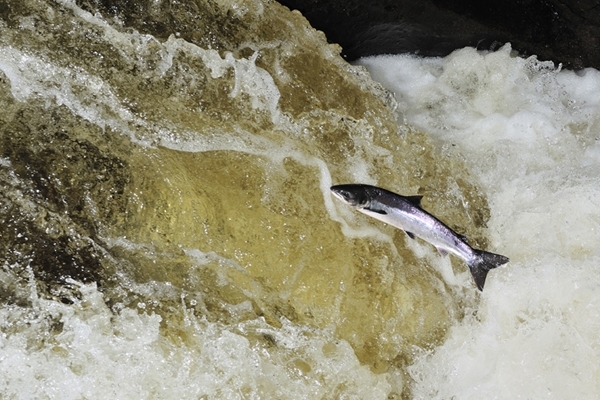
CAPTURING and tagging wild salmon smolts has minimal impact on their survival at sea in typical weather and river temperatures, a new study has shown.
Fisheries scientists from the Game & Wildlife Conservation Trust (GWCT) and Centre for Environment, Fisheries & Aquaculture Science (Cefas) compared two groups of River Frome juvenile salmon smolts over a seven-year period to see if the trapping and tagging process affected their return rate, having marked both groups with passive integrated transponder (PIT) tags the previous autumn.
The ‘experimental’ group of salmon smolts were detected via their PIT tags and then captured in a rotary screw trap – a floating device that consists of a large conical chamber with a screw thread inside, rotated by the river flow – and marked with coded wire tags (CWT) during their spring migration to sea.
In contrast, the ‘control’ group were not trapped and tagged but rather were only detected via their PIT tags.
The PIT tags were then used to monitor fish returning to their home river as adults to spawn, and this return rate was compared between the two groups. The environmental and river conditions before and at the time of trapping and tagging were recorded and included in the analysis, including river temperature and discharge (amount of water flowing).
This was done to see whether the trapped and tagged individuals had the same adult return rate as smolts that weren’t recaptured in the spring, and whether this was affected by the circumstances under which the trapping and tagging took place.
Findings from the study, carried out from 2005 to 2012 and completed as part of the GWCT SAMARCH project * (www.samarch.org.uk), showed that fish in the experimental group that migrated at night in years that followed a mild winter had a lower return rate than those in the control group. This means that fewer smolts from the experimental group returned to their home river as adults.
However, in years with more normal weather conditions and river temperatures, the adult return rate was the same for both groups, suggesting that the extra trapping and tagging process did not affect the fish.
Rasmus Lauridsen, head of fisheries research at GWCT, explained: “After winters with unusually mild river temperatures, the return rate for the experimental group was lower than for the control group, if the smolts travelled at night. This could be because the smolts are more susceptible to any additional negative effects of capture and CWT-tagging if conditions are not ideal.”
“There are many possible reasons for these findings, for example fish that have undergone the tagging process might be more vulnerable to predation, but there are certainly lots of other factors that are likely to contribute to the chance of adults returning to their home river to breed.”
To read the paper, Under what circumstances does the capture and tagging wild Atlantic salmon Salmo Salar smolts affect probability of return as adults? in full here https://www.gwct.org.uk/research/scientific-publications/2018/riley2018/
You can read a plain English summary of the study here.
*The SAMARCH – SAlmonid MAnagement Round the CHannel Project, is part funded by the EU’s Interreg France England Channel 5A programme. Further information on SAMARCH can be obtained from www.samarch.org and www.channelmanche.com/
Notes to editors
The Game & Wildlife Conservation Trust – providing research-led conservation for a thriving countryside. The GWCT is an independent wildlife conservation charity which has carried out scientific research into Britain’s game and wildlife since the 1930s. We advise farmers and landowners on improving wildlife habitats. We employ more than 60 post-doctoral scientists and other research staff with expertise in areas such as birds, insects, mammals, farming, fish and statistics. We undertake our own research as well as projects funded by contract and grant-aid from government and private bodies.
For information, contact:
Eleanor Williams
Telephone: 07592 025476
Email: press@gwct.org.uk